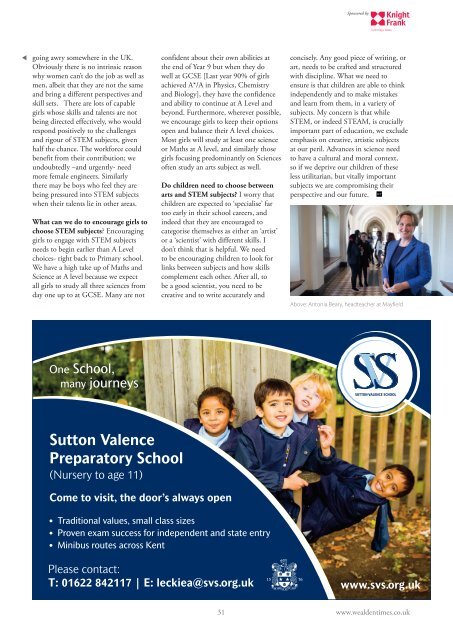Education | ED03 | Summer 2016
A Wealden Times Magazine
A Wealden Times Magazine
Create successful ePaper yourself
Turn your PDF publications into a flip-book with our unique Google optimized e-Paper software.
Sponsored by<br />
Tunbridge Wells<br />
<br />
going awry somewhere in the UK.<br />
Obviously there is no intrinsic reason<br />
why women can’t do the job as well as<br />
men, albeit that they are not the same<br />
and bring a different perspectives and<br />
skill sets. There are lots of capable<br />
girls whose skills and talents are not<br />
being directed effectively, who would<br />
respond positively to the challenges<br />
and rigour of STEM subjects, given<br />
half the chance. The workforce could<br />
benefit from their contribution; we<br />
undoubtedly –and urgently- need<br />
more female engineers. Similarly<br />
there may be boys who feel they are<br />
being pressured into STEM subjects<br />
when their talents lie in other areas.<br />
What can we do to encourage girls to<br />
choose STEM subjects? Encouraging<br />
girls to engage with STEM subjects<br />
needs to begin earlier than A Level<br />
choices- right back to Primary school.<br />
We have a high take up of Maths and<br />
Science at A level because we expect<br />
all girls to study all three sciences from<br />
day one up to at GCSE. Many are not<br />
confident about their own abilities at<br />
the end of Year 9 but when they do<br />
well at GCSE [Last year 90% of girls<br />
achieved A*/A in Physics, Chemistry<br />
and Biology], they have the confidence<br />
and ability to continue at A Level and<br />
beyond. Furthermore, wherever possible,<br />
we encourage girls to keep their options<br />
open and balance their A level choices.<br />
Most girls will study at least one science<br />
or Maths at A level, and similarly those<br />
girls focusing predominantly on Sciences<br />
often study an arts subject as well.<br />
Do children need to choose between<br />
arts and STEM subjects? I worry that<br />
children are expected to ‘specialise’ far<br />
too early in their school careers, and<br />
indeed that they are encouraged to<br />
categorise themselves as either an ‘artist’<br />
or a ‘scientist’ with different skills. I<br />
don’t think that is helpful. We need<br />
to be encouraging children to look for<br />
links between subjects and how skills<br />
complement each other. After all, to<br />
be a good scientist, you need to be<br />
creative and to write accurately and<br />
concisely. Any good piece of writing, or<br />
art, needs to be crafted and structured<br />
with discipline. What we need to<br />
ensure is that children are able to think<br />
independently and to make mistakes<br />
and learn from them, in a variety of<br />
subjects. My concern is that while<br />
STEM, or indeed STEAM, is crucially<br />
important part of education, we exclude<br />
emphasis on creative, artistic subjects<br />
at our peril. Advances in science need<br />
to have a cultural and moral context,<br />
so if we deprive our children of these<br />
less utilitarian, but vitally important<br />
subjects we are compromising their<br />
perspective and our future.<br />
Above: Antonia Beary, headteacher at Mayfield<br />
One School,<br />
many journeys<br />
Sutton Valence<br />
Preparatory School<br />
(Nursery to age 11)<br />
Come to visit, the door’s always open<br />
• Traditional values, small class sizes<br />
• Proven exam success for independent and state entry<br />
• Minibus routes across Kent<br />
Please contact:<br />
T: 01622 842117 | E: leckiea@svs.org.uk<br />
www.svs.org.uk<br />
31 www.wealdentimes.co.uk<br />
SuttonValence<strong>ED03</strong>.indd 1 17/05/<strong>2016</strong> 12:09


















